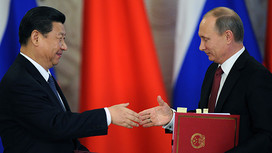據(jù)英國《金融時報》6月8日報道 ,,兩名頂級銀行家透露,由于擔(dān)心西方制裁可能帶來的凍結(jié)美元結(jié)算,,俄羅斯公司準備在訂立合同時改為用人民幣或亞洲其他貨幣結(jié)算,。
德意志銀行俄羅斯負責(zé)人帕維爾·特普盧欣表示:“過去幾周俄羅斯大型公司對這一市場表現(xiàn)出濃厚興趣,它們開始使用很多人民幣及其他亞洲貨幣的產(chǎn)品,,并在亞洲地區(qū)開設(shè)賬戶”,。
國有的俄羅斯外貿(mào)銀行首席執(zhí)行官安德烈·科斯京表示,,擴大使用美元以外貨幣是該銀行的“主要任務(wù)”之一。他簡要地向俄羅斯總統(tǒng)弗拉基米爾·普京介紹說,,發(fā)展使用盧布和人民幣結(jié)算,是他們自5月以來的“重點”工作,。
開設(shè)賬戶以人民幣,、港幣和新加坡元開展貿(mào)易的舉動,突顯俄羅斯在與歐洲關(guān)系陷入緊張之際正試圖將目光轉(zhuǎn)向亞洲,。
自從俄羅斯3月吞并克里米亞以來,,西方制裁正推動俄羅斯公司降低對西方金融市場的依賴,同時美歐銀行大幅減緩了各自在俄羅斯的放貸活動,。
俄羅斯央行也在致力于創(chuàng)建一套支付系統(tǒng),,以降低俄羅斯對維薩和萬事達等西方集團的依賴。
另一家歐洲大型銀行的俄羅斯負責(zé)人表示:“俄羅斯試圖降低對美元的依賴是很正常的,,事實上這種行為完全合情合理,。”他補充說,俄羅斯對美元的巨大敞口令其在危機時刻更容易受到市場波動的影響,。他說:“沒有理由一定要用美元結(jié)算對日貿(mào)易,。”
一家70%營收來自以美元結(jié)算出口貿(mào)易的俄羅斯制造商的首席執(zhí)行官表示,他的公司已經(jīng)做好準備工作,,一旦遭遇進一步制裁即可改變合同結(jié)算貨幣,。他說:“一旦情況發(fā)生變化,我們已準備好改用其他貨幣諸如人民幣或港幣結(jié)算,。”
俄羅斯天然氣工業(yè)公司石油部門首席執(zhí)行官亞歷山大·久科夫表示,,已與客戶討論過改用美元以外貨幣結(jié)算合同的可能性,而諾里爾斯克鎳業(yè)(公司)對《金融時報》說,,正與中國客戶討論用人民幣訂立長期合同的事宜,。
德意志銀行特普盧欣認為,“這似乎并非個例,,而是一種趨勢”,。他還補充道,俄羅斯企業(yè)通過“變更合同允許它們在必要的時候調(diào)整結(jié)算的貨幣”,,俄羅斯企業(yè)就可能防范未來美國進一步制裁帶來的風(fēng)險,。
一些政客建議俄羅斯在經(jīng)濟上通過完全的"去美元化"來回應(yīng)西方的制裁。
但是在與大公司探討加強經(jīng)濟的同時,,俄羅斯政府呼吁關(guān)注國內(nèi)經(jīng)濟,,用其他貨幣進行更多的貿(mào)易結(jié)算,而不是單一地用美元結(jié)算,,俄羅斯政府拒絕了采取更多極端措施,。
普京的經(jīng)濟顧問安德烈·別洛烏佐夫表示,,“只要俄羅斯沒有面臨被人為地從美元體系斷開的系統(tǒng)性制裁……那么我認為俄羅斯不會采取任何措施去人為地‘去美元化’”。
Russian companies are preparing to switch contracts to renminbi and other Asian currencies amid fears that western sanctions may freeze them out of the US dollar market, according to two top bankers.
“Over the last few weeks there has been a significant interest in the market from large Russian corporations to start using various products in renminbi and other Asian currencies and to set up accounts in Asian locations,” Pavel Teplukhin, head of Deutsche Bank in Russia, told the Financial Times.
Andrei Kostin, chief executive of state bank VTB, said that expanding the use of non-dollar currencies was one of the bank’s “main tasks”.
“Given the extent of our bilateral trade with China, developing the use of settlements in roubles and yuan [renminbi] is a priority on the agenda, and so we are working on it now,” he told Russia’s President Vladimir Putin during a briefing. “Since May, we have been carrying out this work.”
The move to open accounts to trade in renminbi, Hong Kong dollars or Singapore dollars highlights Russia’s attempt to pivot towards Asia as its relations with Europe become strained.
Sanctions are pushing Russian companies to reduce their dependence on western financial markets while US and European banks have dramatically slowed their lending activity in Russia since the annexation of Crimea in March.
The central bank is working to create a national payment system to reduce the country’s dependence on western companies such as Visa and MasterCard.
“There is nothing wrong with Russia trying to reduce its dependency on the dollar, actually it is an entirely reasonable thing to do,” said the Russia head of another large European bank. He added that Russia’s large exposure to the dollar subjects it to more market volatility in times of crisis. “There is no reason why you have to settle trade you do with Japan in dollars,” he said.
The chief executive of a Russian manufacturer that derives 70 per cent of its revenues from export in US dollars said his company had done the groundwork to move its contract settlements to different currencies in the event of further sanctions. “If something happens, we are ready to switch to other currencies, for example to the Chinese yuan or the Hong Kong dollar,” he said.
Alexander Dyukov, chief executive of Gazprom’s oil division, has said that the company has discussed with its customers the possibility of shifting contracts out of dollars, while Norilsk Nickel told the FT that it was discussing denominating long-term contracts with Chinese consumers in renminbi.
“It looks like this is not just a blip, this is a trend,” said Mr Teplukhin of Deutsche Bank. He added that Russian companies were able to hedge the risk of further US sanctions by “changing the letter of their contracts to allow them to change currency if it is necessary”.
Some politicians have suggested Moscow should respond to western sanctions by entirely “de-dollarising” its economy.
But while in recent discussions with big business about how to make the economy less vulnerable the government has advocated listing back home and settling more trade in currencies other than the dollar, it has rejected more extreme measures.
“As long as Russia is not subject to systemic sanctions, which could bring an artificial limit to our economy’s access to dollars . . . then I don’t think Russia will take any steps in order to bring about artificial de-dollarisation,” said Andrei Belousov, economic adviser to Mr Putin.








